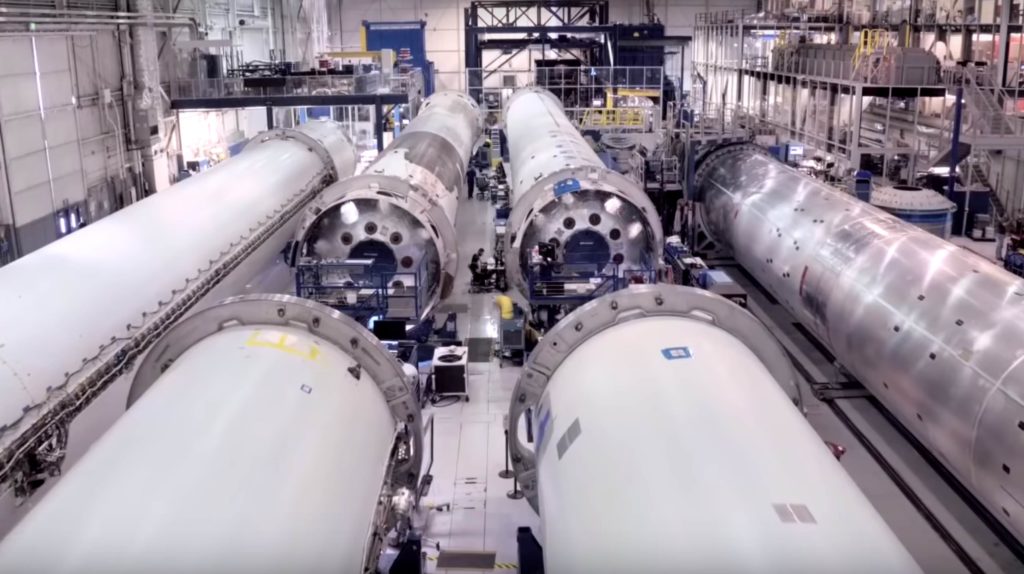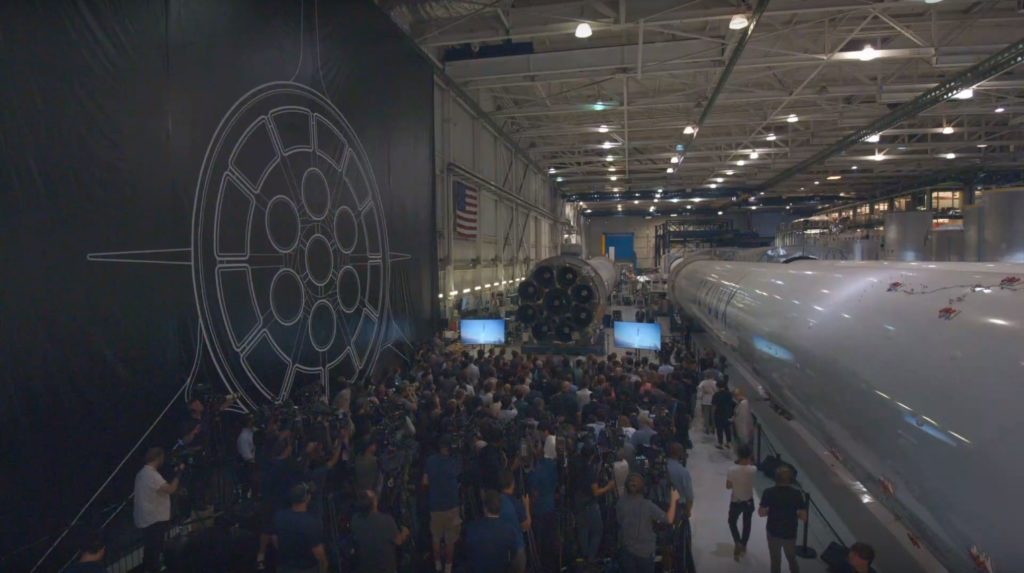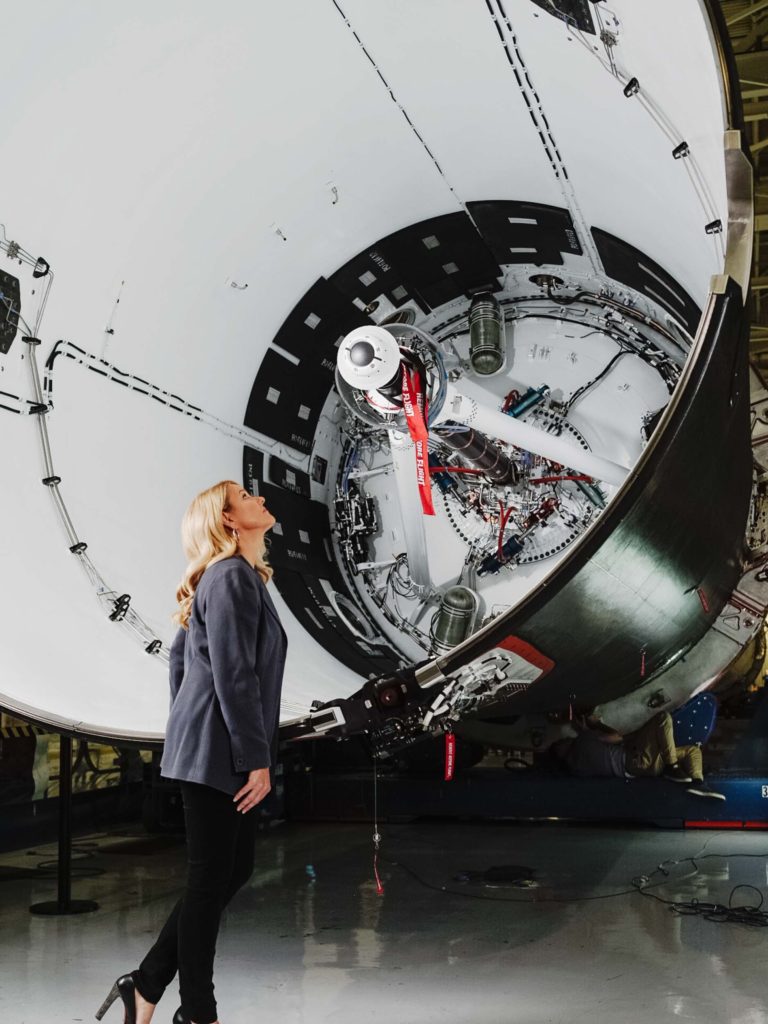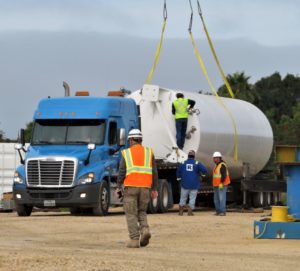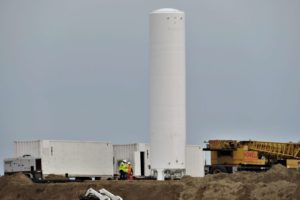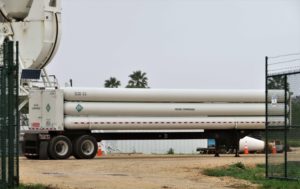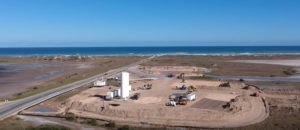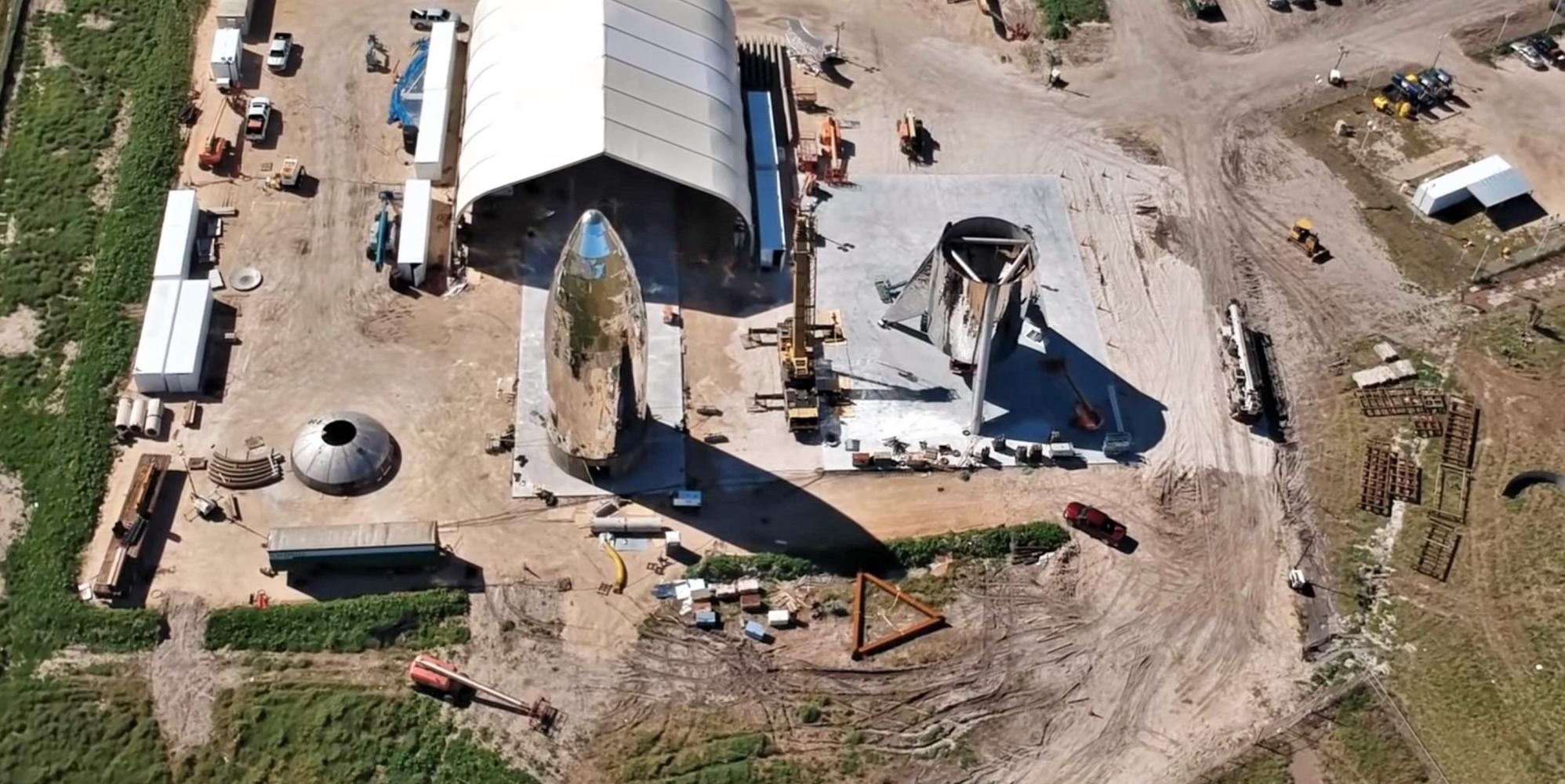
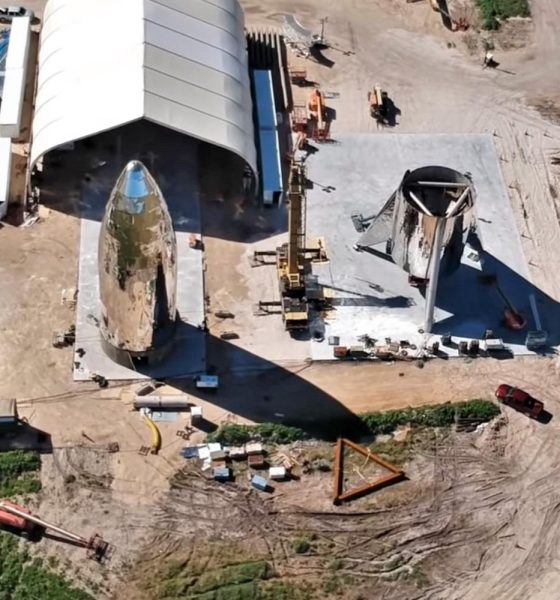
News
SpaceX fits Starship prototype with tank bulkheads as hop test pad progresses
SpaceX workers have begun installing fuel and oxidizer tank bulkheads inside the first BFS/Starship prototype at the same time as the vehicle’s nearby ‘launch’ facility continues to sprout important infrastructure and slowly morph from a giant pile of dirt into something capable of supporting rocket hop tests.
Several observable characteristics of this project still do not immediately make sense but whatever the direction SpaceX is moving in, engineers and technicians are working around the clock to ensure that progress is steady.
Whoa! BCGal hangin' with it, late Sunday. Much anticipated #StarHopper fuel tank bits getting a lift. #SpaceX (📷 credit: NSF/BocaChicaGal) pic.twitter.com/GLBl58kZSA
— Cowboy Dan (@CowboyDanPaasch) January 21, 2019
Moreso than any other single part, the most confusing aspect of Starhopper has to be the apparent condition of its steel tank domes, distinctly covered with a patina of impurities like rust, dirt, dust, and grime. For a water tower or other miscellaneous storage tank, this would be completely acceptable. For aerospace-grade propellant tanks that will have to safely store dozens or even hundreds of tons of supercool liquid methane and oxygen to feed ultra-high-performance Raptor engines, the purity of ingested propellant and thus the cleanliness of the tanks holding it is going to be of paramount importance.
To use an example that applies to the rockets SpaceX currently flies, Falcon 9’s first and second stages are almost always drained and cleaned before and after their first static fire tests in McGregor, Texas to ensure that no unintended debris is ingested by Merlin turbopumps. This is necessary because Falcon rockets are currently built in an extremely large hangar that simply cannot feasibly be kept to cleanroom conditions, while SpaceX’s garment requirements are less strict than some old-guard aerospace companies, typically letting workers wear normal clothes (albeit with hairnets/beardnets) while working inside Falcon 9 tanks and structures. The improved work conditions and worker comfort comes at the cost of frequent tank cleaning.
- An overview of SpaceX’s Hawthorne factory floor. (SpaceX)
- SpaceX hosted a media event inside the factory in September 2018. (SpaceX)
- A Falcon 9 Block 5 booster bares its interstage and pusher rod, offering a perfect illustration of its scale. (Bloomberg)
While SpaceX clearly has a great deal of experience with nontraditional methods of rocket production, the Hawthorne assembly line might be the cleanest cleanroom on Earth compared to Starhopper’s rusty tank domes and fully-outdoors assembly. Even odder is the apparent fact that SpaceX is actually installing (and maybe even welding) those tank domes without any cleaning at all, indicating that they either look far worse than they actually are, are not a real problem for Raptor or cryogenic propellant tanks, or will be scoured only after installation. Regardless, SpaceX is keeping close followers and those familiar with aerospace on the tips of their toes as Starhopper continues to be worked on.
(Launch) pad progress
Roughly one mile to the east of Starhopper’s assembly roost, SpaceX employees and contractors have been working to complete earthmoving and start outfitting a prospective Starhopper prototype launch pad with a stable concrete base and all the infrastructure needed to support a complex rocket and its propellant, electricity, and heat-resistant surface needs. However, despite recent statements from executives like CEO Elon Musk and COO/President Gwynne Shotwell, the ‘facility’ appears to be many, many months away from anything reminiscent of an actual launch pad like the three SpaceX currently operates in California and Florida.
A calm and quiet day at #spacex pic.twitter.com/QKcOJ9tPTY
— Austin Barnard🚀 (@austinbarnard45) January 21, 2019
Instead, it seems that the first BFR-related launch facility will be more of a Spartan, minimalist slab of concrete, a healthy berm, and a handful of propellant tanks and heat exchangers, much like the ‘pad’ that supported Falcon 9’s Grasshopper and F9R hoppers. Over the last few days, the pad construction crew has installed the first of those propellant tanks and heat exchangers and continue to refine the overall layout of the site, still primarily made of compacted dirt. Given the potential simplicity of a Grasshopper-style launch and landing pad, the facility could be anywhere from a few weeks to a few months away from completion.
- SpaceX workers installed the first propellant tank on January 16th. (NASASpaceflight – bocachicagal)
- The first of two tanks recently installed at the new site. (NASASpaceflight – bocachicagal)
- A helium truck arrived on the same day, most likely delivering the gas for welding operations. (NASASpaceflight – bocachicagal)
- An overview of Starhopper’s future pad, currently in the early stages of construction. (Austin Barnard)

News
Tesla ships out update that brings massive change to two big features
“This change only updates the name of certain features and text in your vehicle,” the company wrote in Release Notes for the update, “and does not change the way your features behave.”

Tesla has shipped out an update for its vehicles that was caused specifically by a California lawsuit that threatened the company’s ability to sell cars because of how it named its driver assistance suite.
Tesla shipped out Software Update 2026.2.9 starting last week; we received it already, and it only brings a few minor changes, mostly related to how things are referenced.
“This change only updates the name of certain features and text in your vehicle,” the company wrote in Release Notes for the update, “and does not change the way your features behave.”
The following changes came to Tesla vehicles in the update:
- Navigate on Autopilot has now been renamed to Navigate on Autosteer
- FSD Computer has been renamed to AI Computer
Tesla faced a 30-day sales suspension in California after the state’s Department of Motor Vehicles stated the company had to come into compliance regarding the marketing of its automated driving features.
The agency confirmed on February 18 that it had taken a “corrective action” to resolve the issue. That corrective action was renaming certain parts of its ADAS.
Tesla discontinued its standalone Autopilot offering in January and ramped up the marketing of Full Self-Driving Supervised. Tesla had said on X that the issue with naming “was a ‘consumer protection’ order about the use of the term ‘Autopilot’ in a case where not one single customer came forward to say there’s a problem.”
This was a “consumer protection” order about the use of the term “Autopilot” in a case where not one single customer came forward to say there’s a problem.
Sales in California will continue uninterrupted.
— Tesla North America (@tesla_na) December 17, 2025
It is now compliant with the wishes of the California DMV, and we’re all dealing with it now.
This was the first primary dispute over the terminology of Full Self-Driving, but it has undergone some scrutiny at the federal level, as some government officials have claimed the suite has “deceptive” names. Previous Transportation Secretary Pete Buttigieg was one of those federal-level employees who had an issue with the names “Autopilot” and “Full Self-Driving.”
Tesla sued the California DMV over the ruling last week.
News
Tesla workers push back against Giga Berlin unionization
“IG Metall did not succeed in Giga Berlin‘s works council election earlier today. The union share was reduced from nearly 40% in 2024 to 31% in 2026! This is a clear message by the Giga Berlin team towards an independent co-determination! The list called Giga United, led by the current chairwoman, Michaela Schmitz, received the most votes with more than 40%! Good news for Giga Berlin!”

Tesla workers pushed back against unionization efforts at Gigafactory Berlin, and over the past few years, there has been a dramatic decrease in interest to unionize at the German plant.
Gigafactory Berlin Plant Manager André Thierig announced on Wednesday that IG Metall, the European union group, saw its share reduce from 40 to 31 percent in 2026 as employees eligible to vote on the issue. Instead, the Giga Berlin team, known as Giga United, received the most votes with more than 40 percent.
BREAKING! 🚨
IG Metall did not succeed in Giga Berlin‘s works council election earlier today. The union share was reduced from nearly 40% in 2024 to 31% in 2026!
This is a clear message by theGiga Berlin team towards an independent co-determination!
The list called Giga…
— André Thierig (@AndrThie) March 4, 2026
Thierig gave specific details in a post on X:
“IG Metall did not succeed in Giga Berlin‘s works council election earlier today. The union share was reduced from nearly 40% in 2024 to 31% in 2026! This is a clear message by the Giga Berlin team towards an independent co-determination! The list called Giga United, led by the current chairwoman, Michaela Schmitz, received the most votes with more than 40%! Good news for Giga Berlin!”
There were over 10,700 total employees who were eligible to vote, with 87 percent of them turning out to cast what they wanted. There were three key outcomes: Giga United, IG Metall, and other notable groups, with the most popular being the Polish Initiative.
The 37-seat council remains dominated by non-unionized representatives, preserving Giga Berlin as Germany’s only major auto plant without a collective bargaining agreement.
Thierig and Tesla framed the outcome as employee support for an “independent, flexible, and unbureaucratic” future, enabling acceleration on projects like potential expansions or new models. IG Metall expressed disappointment, accusing management of intimidation tactics and an “unfair” campaign.
The first election of this nature happened back in 2022. In 2024, IG Metall emerged as the largest single faction with 39.4 percent, but non-union lists coalesced for a majority.
But this year was different. There was some extra tension at Giga Berlin this year, as just two weeks ago, an IG Metall rep was accused by Tesla of secretly recording a council meeting. The group countersued for defamation.
Tesla Giga Berlin plant manager faces defamation probe after IG Metall union complaint
This result from the 2026 vote reinforced Tesla’s model of direct employee-management alignment over traditional German union structures, amid ongoing debates about working conditions. IG Metall views it as a setback but continues advocacy. Tesla sees it as validation of its approach in a competitive EV market.
This outcome may influence future labor dynamics at Giga Berlin, including any revival of expansion plans or product lines, which Musk has talked about recently.
News
SpaceX President Gwynne Shotwell details xAI power pledge at White House event
The commitment was announced during an event with United States President Donald Trump.

SpaceX President Gwynne Shotwell stated that xAI will develop 1.2 gigawatts of power at its Memphis-area AI supercomputer site as part of the White House’s new “Ratepayer Protection Pledge.”
The commitment was announced during an event with United States President Donald Trump.
During the White House event, Shotwell stated that xAI’s AI data center near Memphis would include a major energy installation designed to support the facility’s power needs.
“As you know, xAI builds huge supercomputers and data centers and we build them fast. Currently, we’re building one on the Tennessee-Mississippi state line. As part of today’s commitment, we will take extensive additional steps to continue to reduce the costs of electricity for our neighbors…
“xAI will therefore commit to develop 1.2 GW of power as our supercomputer’s primary power source. That will be for every additional data center as well. We will expand what is already the largest global Megapack power installation in the world,” Shotwell said.
She added that the system would provide significant backup power capacity.
“The installation will provide enough backup power to power the city of Memphis, and more than sufficient energy to power the town of Southaven, Mississippi where the data center resides. We will build new substations and invest in electrical infrastructure to provide stability to the area’s grid.”
Shotwell also noted that xAI will be supporting the area’s water supply as well.
“We haven’t talked about it yet, but this is actually quite important. We will build state-of-the-art water recycling plants that will protect approximately 4.7 billion gallons of water from the Memphis aquifer each year. And we will employ thousands of American workers from around the city of Memphis on both sides of the TN-MS border,” she noted.
The Ratepayer Protection Pledge was introduced as part of the federal government’s effort to address concerns about rising electricity costs tied to large AI data centers, as noted in an Insider report. Under the agreement, companies developing major AI infrastructure projects committed to covering their own power generation needs and avoiding additional costs for local ratepayers.
